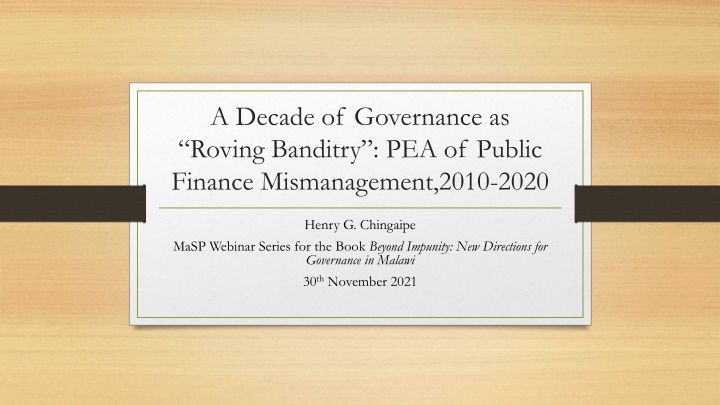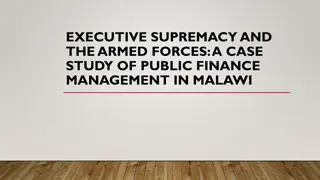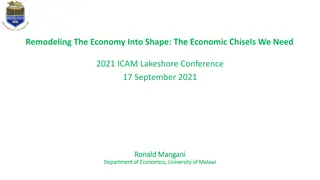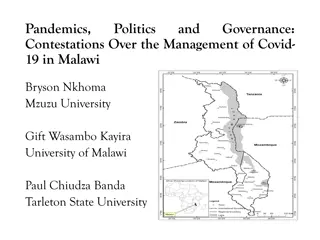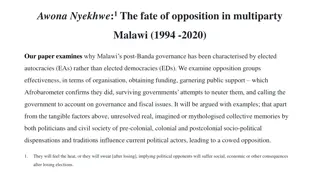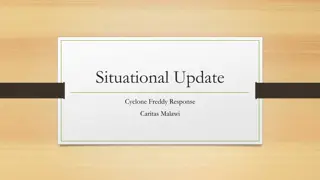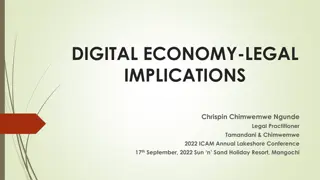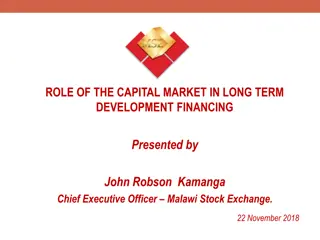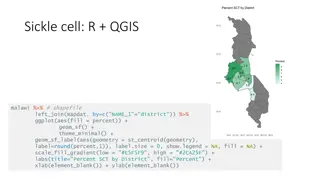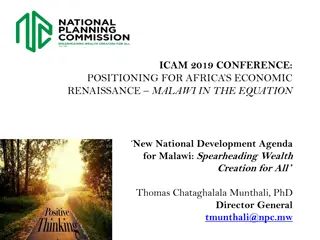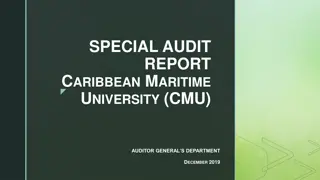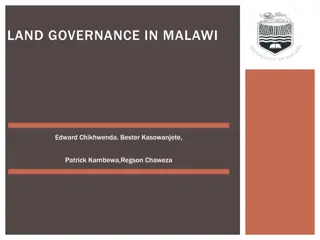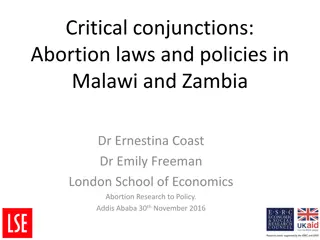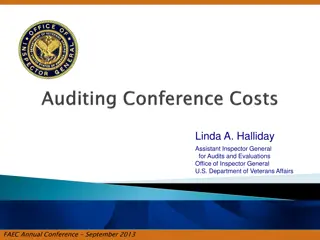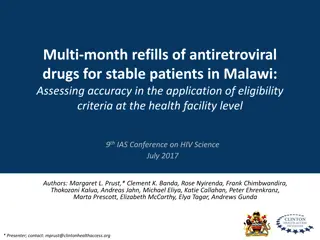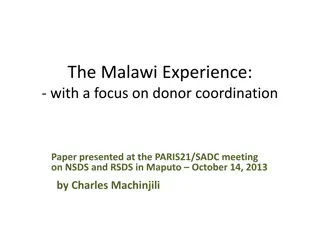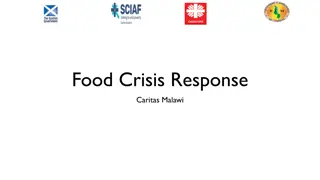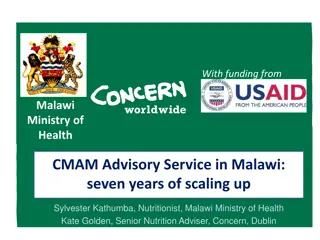Decade of Governance in Malawi: A Deep Dive into Public Finance Mismanagement
Explore a critical analysis of governance in Malawi from 2010 to 2020, focusing on the pervasive issue of public finance mismanagement. Uncover insights into the metaphor of roving banditry in relation to public financial management (PFM) and its consequences. Delve into the challenges faced by the government, implications of mismanagement, and recommendations for improvement, based on recent research and expert opinions.
Download Presentation

Please find below an Image/Link to download the presentation.
The content on the website is provided AS IS for your information and personal use only. It may not be sold, licensed, or shared on other websites without obtaining consent from the author.If you encounter any issues during the download, it is possible that the publisher has removed the file from their server.
You are allowed to download the files provided on this website for personal or commercial use, subject to the condition that they are used lawfully. All files are the property of their respective owners.
The content on the website is provided AS IS for your information and personal use only. It may not be sold, licensed, or shared on other websites without obtaining consent from the author.
E N D
Presentation Transcript
A Decade of Governance as Roving Banditry : PEA of Public Finance Mismanagement,2010-2020 Henry G. Chingaipe MaSP Webinar Series for the Book Beyond Impunity: New Directions for Governance in Malawi 30thNovember 2021
The whole entire Government of Malawi is a criminal enterprise That is what I discovered. Mr. Paul Mphwiyo, Former Budget Director Shaun Raviv, Cashgate: How a Scandal started by a Poor Housemaid ended up taking down the most powerful woman in Africa , Latterly Magazine, 14 May 2018, 8.
Outline 1. Context 2. PFM and its centrality to statecraft 3. The Metaphor of Roving Banditry and its application to PFM 4. The Opportunity costs of Public Finance Mismanagement 5. Mismanagement across the PFM Chain 6. A PEA explanation of Public Finance Mismanagement 7. Conclusion/Implications?Recommendations
Context 6thJuly 2020: Inauguration of LMC; Rubble Speech; Zenith of a critical juncture Expectations of change: totality of configuration of power and exercise of admin authority; Expectations of a simultaneity of democratic governance and socio-economic transformation WHY?
1.Growing Dissatisfaction with impunity and politics of exclusion
2.Inability of the political regimes to deliver simultaneously democracy and development Non democratic developmental (B) Democratic development (A) HKB BwM1 ??? BEM BwB2 JMB APM No longer an option Non democratic; non- development Democratic non development (C)
LMCs Inaugural Speech and PFM 8 types of rubble all implying PFM: 1. Corruption taxes in ruins; 2. Laziness infrastructure in ruins 3. Passivism rights in ruins 4. Donor dependency- dignity in ruins 5. Regionalism nationhood in ruins 6. Negativity resolve in ruins 7. ruins Impunity governance institutions in 8. incompetence- service in ruins Unprofessionalism and
PFM and its centrality to statecraft The ability of any government to deliver the greatest good for the greatest numbers depends on the quality of its public finance management; PFM means ability to mobilise, manage, prudently spend, and enforce accountability for public resources The state of PFM bestows on the state its character: Predatory, patrimonial, captured, kleptocratic, fragile, weak Developmental, effective, people-centred
The Metaphor of Roving Banditry All states are bandits. The difference is in whether they behave as stationary or roving bandits Banditry: Warlords led armed bands, conquered territory and extracted resources from the population Stationary bandits: Establish taxation systems for extraction of resources; maintain strong armies to fend off other armed bands and protect their access to the economic surplus of the population, provide minimal public goods and services such as security of the population
Roving banditry.. Roving bandits carry out intense extraction of the economic surplus from the population using a varied set of schemes including forms of taxation, plunder the populations and their resources for their exclusive benefit; and move on to other territories pretty much like nomads. Roving bandits have short time horizons; no incentive for investing in public goods and services to enable the captive populations to continue their economic activities and prosper.
Applied to public finance mismanagement in Malawi between 2010-2020, roving banditry describes A phenomenon of competitive theft of public resources (money and assets); Involving state elites (politicians and bureaucrats) and many of their supporters and beneficiaries ; Deployed multiple schemes to siphon and privatize public resources in the short periods they had control of the levers of power of the state.
Opportunity Costs of Public Finance Mismanagement MK90 billion misappropriated between 2009 and April 2012 (Bingu s second term) MK20 billion misappropriated in six months when Government and the public purse were entrusted to President Joyce Banda and her Peoples Party Using the cost figures presented in the national budget of 2014/2015 financial year, illustrative opportunity costs were worked out:
Box 1: Illustrative opportunity costs of public finance mismanagement in the health sector: With the MK110 billion: Train over 40,000 medical doctors at College of Medicine (CoM) over a period of five years; Construct 314 health centers, each with about five new houses for healthcare workers; Effectively support the delivery of services in all government health facilities for more than two years. MK20 billion was enough to provide all health services in Nsanje district for 80 years. MK110 billion was worth 440 years of health services in Nsanje at the cost prices of 2014.
Public Finance Mismanagement 2010-20 2. Budget allocation Domestic and international loans Loss of tax revenues Mismanagent of revenues at source Audit non- compliance Ineffective parliamentary oversight Captured Anti- Corruption Bureau Slow judicial processes 3. Budget Expenditure Allocation of resources to patronage-driven programmes; Populist and non- strategic allocation of resources Statutory expenditures without sufficient accountability Allocations to imaginary political project 1. Revenue Mobilization
A PEA Explanation of Persistent Public Finance Mismanagement Why did reforms not yield the kind of PFM that was desirable throughout the decade? Why public monies were mismanaged, pilfered out of the system and remained unaccounted for despite yearly recommendations by the Auditor General and a whole lot of reforms? The pervasiveness of public finance mismanagement and the persistent noncompliance with rules and regulations, show that the formal rules for managing public finances in Malawi have been mostly ineffective.
PEA Formal rules were supplanted by competing informal rules that were politically engineered to enable ruling politicians and their bureaucratic associates to maximize personal benefits from the positions they held; Informal rules reinforced a political logic of feeding off the state and reinforced the notion of politics of the belly i.e. a goat eats where it is tethered. The supplanting of formal rules and good practices in PFM was enabled by three core factors: 1.Redefining of national interests away from the collective good; 2. the weakening of accountability through appointive bureaucracies; 3. a docile citizenry that hardly engaged in social accountability.
Interests, Capture and Repurposing of the State Most public finance mismanagement during the decade was not random; - It was systematized; Dubious procurement processes and collusion; Conspiracy to feed off the state by pressuring the government or individuals in key government positions to divert resources away from most efficient and socially optimal uses to support private accumulation and unearned luxurious lifestyles.
Appointive bureaucracies and their roles in public finance mismanagement An appointive bureaucracy is a cadre of public servants appointed by the President or his proxies into key decision-making positions as agents of the regime and retainers of the President; They use their official positions to pursue and implement schemes of political survival and continuity of the regime; Such cadres create situations in which the interests of individual incumbents are allowed free rein and provide the necessary conditions for schemes that plunder or mismanage public finances.;
Weak Social Accountability Mechanisms for Public Finance Management Loud voices that rarely achieved accountability from public officials on public finance management. Accountability for public finance mismanagement was elusive, except in a few instances where the system had to offer a few sacrificial lambs in order to protect the system from rupture. Civic actors disempowered through cooptation; violence perpetrated by cadres of the political regime; narratives that undermined or discouraged citizen activism in demanding accountable, responsive and inclusive governance.
Broad Recommendations 1.Reform of politics i.e. how political power is configured and exercised is essential for dividends in PFM reforms. This determines whether formal rules and procedures will be complied with or not; Whether decision makers in the public service will serve as retainers of a political regime or trustees of citizens looking after the greatest good for the greatest numbers of citizens.
2. Institutional Reforms: Parliament inadequate mandate; funding for oversight Auditor General advisory role with no authority on uptake ACB Mandates, insulation, political arrears 3. Public Procurement (and contract management) the elephant in the room 4. Recruitment and placement in the public service 5. Revenue audits
to effectively deal with fraud and abuse of public resources and the institutionalized impunity that goes with it, there is need for a good conspiracy of governance and law enforcement institutions. Martha Chidzuma, Ombudsman of Malawi,
